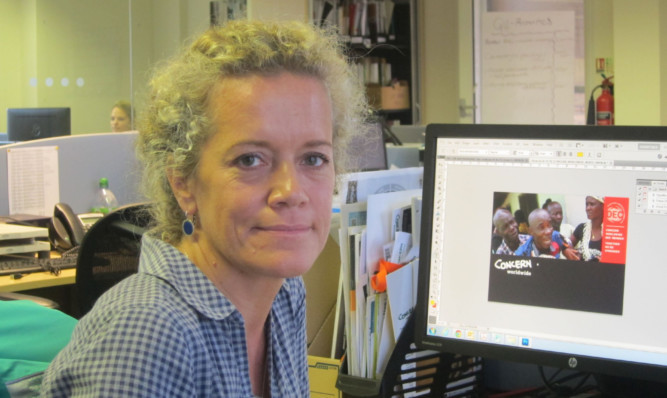A Fife aid worker is spearheading proposals to help Sierra Leone deal with the long-term impact of the deadly ebola virus.
Michelle Wilson is not long back from the West African country where almost 1,800 people have died from the disease.
She helped train about 1,000 health workers on how to spot and treat the outbreak, which has so far claimed the lives of some 5,000 people.
Michelle, who grew up in Methil, said Sierra Leone was just starting to recover from 11 years of civil war when ebola was first reported.
She was already working there as assistant country director of programmes for the charity Concern Worldwide, when their entire focus was forced to change to deal with the infection.
“Health and literacy levels are very, very bad, which makes it difficult for people to read health alerts,” she said.
“In the initial stages, people were very afraid. They were seeing their family members going off to treatment centres never to return.
“There were all sorts of rumours in the beginning that health workers were taking blood from people and killing them, so people were trying to escape from health centres.”
Michelle said people became too terrified to report the illness but the specially-trained health workers were able to allay fears and arrange treatment.
The 45-year-old former Buckhaven High School pupil and St Andrews University graduate was involved in ensuring health workers had simple equipment, such as gloves and chlorine for sterilisation.
“Now, they’re using full body suits but it wasn’t like that to start with,” she said.
With 70% of ebola cases contracted through touching dead bodies, a key part of Concern Worldwide’s work now involves ensuring burials are handled quickly.
“We’re now involved in the management of cemeteries and try-ing to stop burial procedures such as washing and kissing bodies,” said Michelle.
“I heard of a one-year-old boy who died and was buried just 10 minutes later. There are a lot of tough decisions to be made which impact on people’s beliefs and traditional practices.”
Michelle is now working at the charity’s base in London, returning just before health checks were introduced at UK airports. I was screened as I came out of Freetown before I got on the plane but I knew there was no chance of me having it.”
She said it was crucial to have plans in place to help people once the emergency had abated.
“There will be a long-term impact for people who have lost family members,” she said.
“Apart from the emotional impact, they will have lost labour, which makes it difficult for them to farm. We are making sure people are supported and are building trust in the health service again.
“We are looking at proposals which won’t come online till next year.”
The Disasters Emergency Committee is running an appeal for those affected by ebola. Donations can be made at www.dec.org.uk, by calling 0370 60 60 900, or texting “Donate” to 70000 to give £5.
